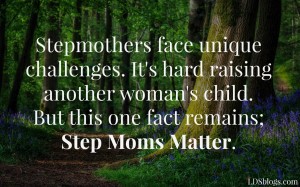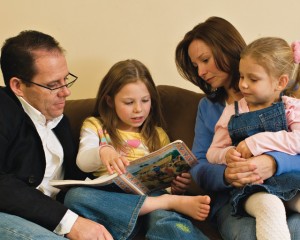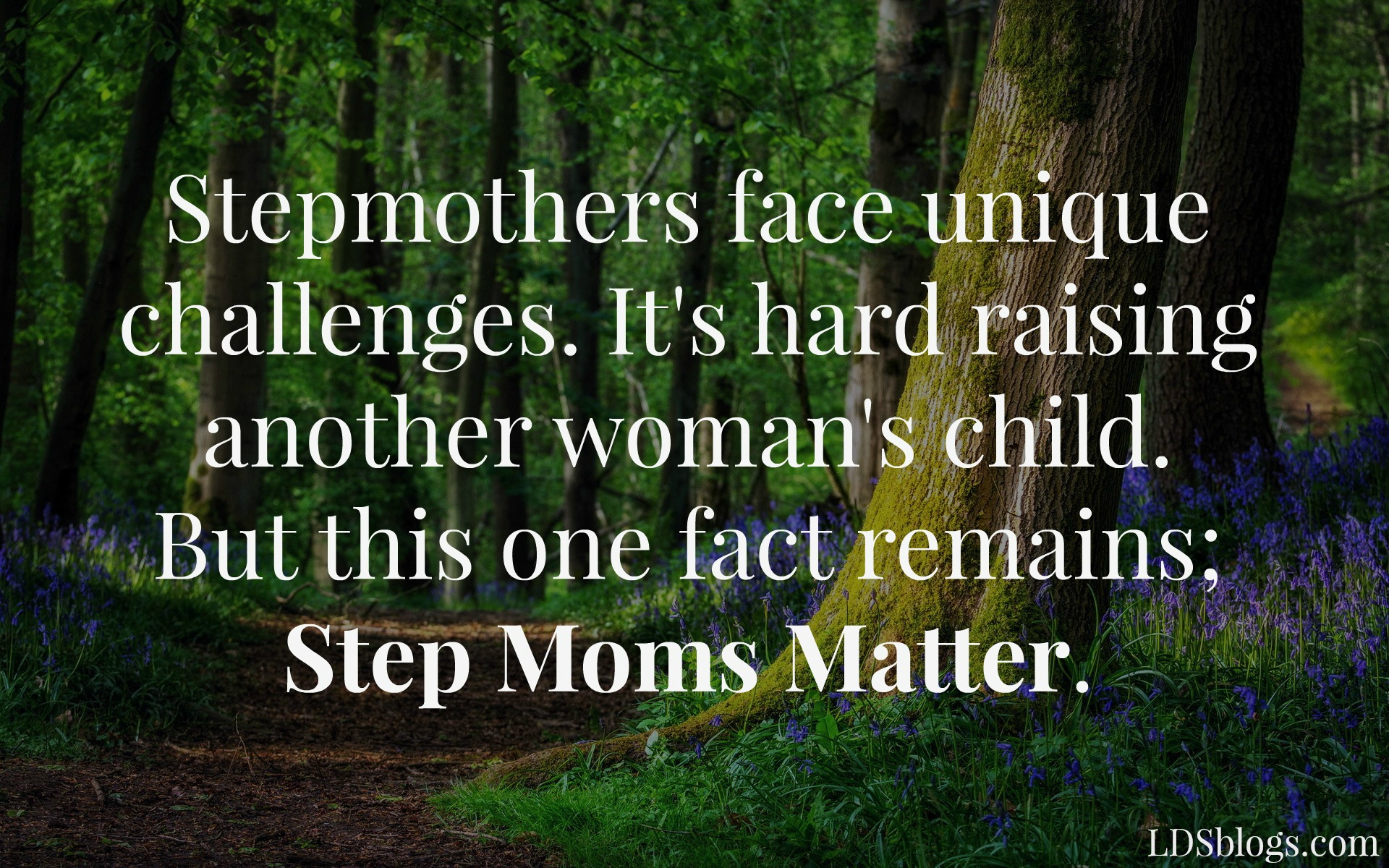No matter how good your marriage is, blending families is hard. It can be done well, but it takes work, commitment, and patience. Oh, that we could all go back and relive those days. I’m sure we would all do things a bit differently.
 I interviewed several people for this article, and I’m just going to summarize what I feel is the most important information to come out of those interviews. Blended families must have unity, and there are some ways to achieve it.
I interviewed several people for this article, and I’m just going to summarize what I feel is the most important information to come out of those interviews. Blended families must have unity, and there are some ways to achieve it.
Communication and Taboos
It obviously helps if all the adults can communicate. One stepmother said she got together with the biological mother prior to marrying her husband and began building a relationship with her. I tried that myself, actually, but without as much success as she had. It is important to realize that you will have a relationship with the other adults in the picture. It’s a matter of what that relationship will be like. There are choices to be made by the adults, and hopefully, those adults will all put the children’s interests first. One parent described the relationship with the biological parent as a “business” relationship. It works for them. Nothing is ever “comfortable,” but things are workable. Several parents mentioned that texting has made communication easier. I would have loved to have had that technology back in the day! All those I interviewed understood the importance of the adults having good relationships, but there was wide variety in the success of the attempts.
 It is a huge taboo for one adult to speak negatively about another adult in front of the children. How can that possibly benefit the children, or the family as a whole? As tempting as it might be on very trying days, just don’t do it.
It is a huge taboo for one adult to speak negatively about another adult in front of the children. How can that possibly benefit the children, or the family as a whole? As tempting as it might be on very trying days, just don’t do it.
The other taboo is pumping the children for information about what is going on in the other household. It is just wrong to use children as pawns in a game of divorce. Unfortunately, this also places boundaries on children as to how much they feel they can confide and share. Maybe the solution is to always be a good listener, but never break confidences. The only confidences that should be broken are those that involve the physical safety of the children.
Most of the stepparents I spoke with felt comfortable talking to their spouse about problems with the children, but most admitted that it took a while to settle into that comfort zone. As with anything in life, trial and error is the name of the game.
Differences of Opinion
I asked the parents I interviewed who handles differences of opinion with the first spouse, and the answer surprised me. I always thought it odd that I had to be the one to settle any differences with my husband’s first wife, and I admit resenting being placed in that position. Apparently (at least among those I interviewed), this is more common than I realized. It was not the case with everyone I interviewed, but a number of families have this relationship, unless the issue is one of a serious parental nature, in which case, the biological parents usually make the decisions.
Finances
When considering marriage, it is important that all the financial baggage gets placed on the table. Parents have a sacred obligation to provide for their children. Like it, or not, the second spouse is part of that financial obligation. It will only work if all the information is available and the second spouse is totally on board with the commitment. Divorce means debt. As one parent put it, “You have to go into marriage with a plan. If you don’t, you will accumulate more debt, and you will create a bigger financial ditch for your family.”
Labels
 There should be no “steps” and “halves.” My biological children always thought of my husband’s son as their brother; not half-brother. It seems like a small thing, but always count everyone in the “How many children do you have?” answer. It is important to all the children to know that everyone matters equally. Our photo albums contained pictures of my husband with his first wife, including their wedding photo. I’m not a saint, and this was not easy for me. However, it was important for two reasons: 1) My husband’s son needed to know that I loved him enough to care, and 2) My biological children needed to learn that their brother had another life and another mother.
There should be no “steps” and “halves.” My biological children always thought of my husband’s son as their brother; not half-brother. It seems like a small thing, but always count everyone in the “How many children do you have?” answer. It is important to all the children to know that everyone matters equally. Our photo albums contained pictures of my husband with his first wife, including their wedding photo. I’m not a saint, and this was not easy for me. However, it was important for two reasons: 1) My husband’s son needed to know that I loved him enough to care, and 2) My biological children needed to learn that their brother had another life and another mother.
Personal Belongings
The families I interviewed differed on the way they handled the children’s personal belongings. Some children had two sets of clothes and toys; one for each household. Some children packed their belongings for visits “right down to the toothbrush.” One family that duplicates everything has a plastic tub with important insurance information and medical information that is passed back and forth for each visit (a good idea). Most families seem to be able to work out schedules for important events and switch the parental time around for the benefit of all without too many hiccups.
Extended Family
Extended family relationships are important. All the children need to feel comfortable in their relationships with the extended family. Most of those I spoke with had success in this area. I learned that when it comes to gifts, all things can’t be equal. It is not only possible, but often a given just by the sheer number of grandparents, that children will be showered with way too many gifts for birthdays and holidays. My personal solution to this was to encourage my parents to develop a relationship with my husband’s son, but to leave the gift giving to the biological grandparents. I’m sure there are other ways of handling that situation.
Parent, or Friend?
It is the consensus of opinion that unless the children are adults at the time of the marriage, the stepparent needs to be a parent, rather than a friend. This sets boundaries from the start, and doesn’t allow the children to play one adult against another. Most stepparents felt comfortable enforcing the rules, but one said that suggestions could be made and the guilt/shame game played, but actual enforcement is left to the biological parents. One stepmother said that while she loves the stepchildren, she finds herself holding back affectionate hugs in fear it will be interpreted as an attempt to replace the biological mother. She holds back because she doesn’t want the children to feel they have to choose between the two women. She is trying to work through this and become more affectionate.
Bad Days and Appreciation
 I asked those who participated if they ever asked themselves, “What have I gotten myself into?” Everyone said yes, absolutely, all the time. One parent said that it would be helpful if the biological parent recognized the sacrifices the stepparent makes for the children. “Thank you” can go a long way. I agree.
I asked those who participated if they ever asked themselves, “What have I gotten myself into?” Everyone said yes, absolutely, all the time. One parent said that it would be helpful if the biological parent recognized the sacrifices the stepparent makes for the children. “Thank you” can go a long way. I agree.
I remember a time when my husband and I were trying to have another child. Somewhere in the process, we found out that the child support we were paying was being adjusted. We didn’t know whether to stop trying to have another baby, or even if I was already pregnant. Because my husband is 12 years older than I am, we didn’t want to wait too much longer to have our last child. My husband was already working two jobs. I was working two nights a week in a law office. The only way to pay the higher child support was for me, the soon to be pregnant stepparent, to work more hours. The only thing that made this somewhat palatable was an acknowledgement of my predicament by my husband’s first wife. Yes, I did ask myself occasionally, “What have I gotten myself into?”
Good Advice
I also asked participants what advice they would give couples considering marriage and a blended family. The best answer: “It’s really hard. Don’t get lost in the Brady Bunch syndrome!! Pray about it. Really hard. You have to sacrifice everything you have for your family . . . and their family (their biological parents). And once you’ve agreed to marry, you can’t look back . . . you’ll destroy your marriage with lots of resentment.”
Perspective
A friend loaned me a book for this project called, I Am a Mother, by Jane Clayson Johnson (Deseret Book, 2007). Jane told the story of accepting her three stepchildren into her life. She told how she had accepted the first job assignment she had had for a while, and how she planned to use some of the money to purchase a new couch. Instead, she found herself paying a friend to renovate the attic bedroom and bathroom for the stepchildren so they would have their own space when they came to visit. She didn’t want to do it, but felt prompted that she needed to do it. She says, “rather than losing my identity with the children, the irony is, I actually feel as though I have further identified my true self. I’ve worked my way through often difficult and complicated, but very human, emotions . . . and found love and peace and tremendous happiness.” (Id. p. 92.)
I can certainly relate to Jane’s feelings. My stepson was the cutest little blond 4-year-old I had ever seen when I married his father. I fell in love with this child the first time I laid eyes on him. I was married two days after my 22nd birthday. What on earth did I know about marriage, divorce, and blended families? My attempt to begin a relationship with his mother and telling her that I had no intention of trying to replace her had not gone well. He wasn’t even allowed to attend our wedding. I made my share of mistakes. The relationships on all sides were difficult for many years. Jane is right; you have to work your way through many complicated human emotions. Through prayer and repentance, we all finally came to an understanding of each other. We were finally able to attend the same LDS congregation. I worked in the children’s Primary (Sunday school) with my husband’s first wife. Finally, there was a time when we were able to sit in an LDS temple together. It was there we found the love and peace of which Jane spoke.
I’m so glad we were able to finally reach that peaceful place in our relationship because my stepson passed away not long afterward. I’ll be forever grateful that he saw my marriage and the relationships grow and change—and that he saw that human hearts can change for the better. Hopefully, we are getting it right with our grandchildren.
About Tudie Rose
Tudie Rose is a mother of four and grandmother of ten in Sacramento, California. You can find her on Twitter as @TudieRose. She blogs as Tudie Rose at http://potrackrose.wordpress.com. She has written articles for Familius. You will find a Tudie Rose essay in Lessons from My Parents, Michele Robbins, Familius 2013, at http://www.familius.com/lessons-from-my-parents.
Twitter •



